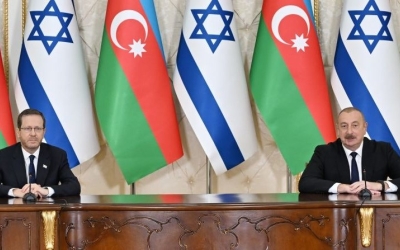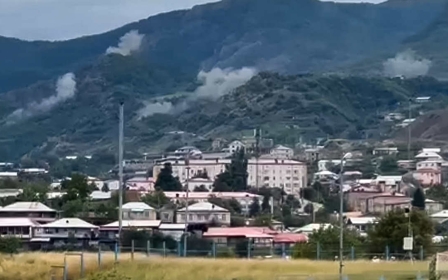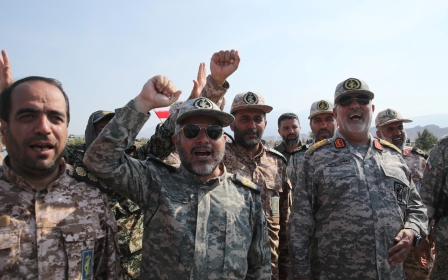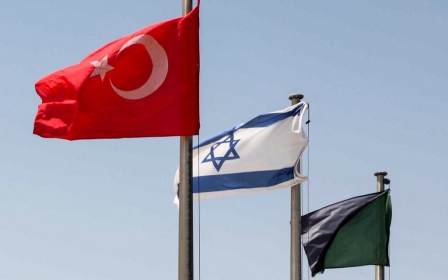Azeri flights to Israeli base recorded ahead of Nagorno-Karabakh operation

Azeri flights to an Israeli airbase spiked in the run-up to a military campaign launched by Azerbaijan in the disputed Nagorno-Karabakh region on Tuesday, flight tracking websites show.
Earlier this month, five flights flown by Azerbaijan's Silk Way Airlines landed at Ovda airport, a military airbase in southern Israel near the city of Eilat, Haaretz reported last week. There have been 11 such flights since March.
Since then, Middle East Eye found another flight which landed in Ovda from Baku on Thursday at 10am local time. It departed Israel two and a half hours later, returning to the Azerbaijani capital.
The recent uptick in flights adds to 92 cargo flights flown by Silk Way Airlines to Ovda in the past seven years, according to a Haaretz investigation in March. That included a spike during violence between Amerian and Azeri forces in Nagorno-Karabakh in 2020.
The flight on Thursday was the same Silk Way aircraft model reported by Haaretz, according to data obtained by FlightRadar 24.
New MEE newsletter: Jerusalem Dispatch
Sign up to get the latest insights and analysis on Israel-Palestine, alongside Turkey Unpacked and other MEE newsletters
On Tuesday, explosions were reported in Stepanakert, the regional capital, with Armenian separatists saying that two civilians had been killed and nearly two dozen injured in the mountainous caucus region. Middle East Eye could not independently verify the claim.
Nagorno-Karabakh is internationally recognised as part of Azerbaijan. But the region, which is majority ethnic Armenian, has been run by a breakaway Armenian authority.
Tensions in the region have been brewing for months with Armenia and Azerbaijan trading accusations of cross-border attacks.
Azerbaijan has imposed a de facto blockade on the Lachin corridor, the sole road connecting Nagorno-Karabakh to Armenia, and the only artery for food and medical deliveries to the impoverished region.
Fighting in the region first broke out in 1988 between Armenian separatists and Azerbaijani troops during the collapse of the Soviet Union. After a 1994 truce, the region was left under effect Armenian control. Since then, Baku has been able to upgrade its military arsenal using energy revenue to purchase Turkish drones and military hardware from Israel.
In 2020, Azerbaijan launched a military operation with Turkish backing and recaptured most of the territory.
Azerbaijan and Israel have maintained close relations since the former's independence in the early 1990s. Baku provides an estimated 30 to 50 percent of Israel's oil and gas needs, transported mainly through the Baku-Tbilisi-Ceyhan pipeline.
Azerbaijan is also an important customer of Israeli military equipment and weapons systems, including an air defence system that Azeri forces recently tested during a drill.
Middle East Eye delivers independent and unrivalled coverage and analysis of the Middle East, North Africa and beyond. To learn more about republishing this content and the associated fees, please fill out this form. More about MEE can be found here.





